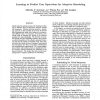Free Online Productivity Tools
i2Speak
i2Symbol
i2OCR
iTex2Img
iWeb2Print
iWeb2Shot
i2Type
iPdf2Split
iPdf2Merge
i2Bopomofo
i2Arabic
i2Style
i2Image
i2PDF
iLatex2Rtf
Sci2ools
86
Voted
AAAI
1998
1998
Learning to Predict User Operations for Adaptive Scheduling
Mixed-initiativesystemspresent the challengeof finding an effective level of interaction betweenhumans and computers. Machinelearning presents a promising approachto this problemin the form of systems that automatically adapt their behavior to accommodate different users. In this paper, wepresent an empirical study of learning user modelsin an adaptive assistant for crisis scheduling.Wedescribe the problemdomainand the schedulingassistant, then present an initial formulationof the adaptiveassistant's learning task andthe results of a baselinestudy. Afterthis, wereport the results of three subsequentexperiments that investigate the effects of problemreformulation and representation augmentation.Theresults suggest that problemreformulationleads to significantly better accuracywithoutsacrificing the usefulnessof the learned behavior.Thestudies also raise several interesting issues in adaptiveassistancefor scheduling.
AAAI 1998 | Adaptiveassistant's Learning Task | Effective Level | Intelligent Agents | Interaction Betweenhumans |
Related Content
| Added | 01 Nov 2010 |
| Updated | 01 Nov 2010 |
| Type | Conference |
| Year | 1998 |
| Where | AAAI |
| Authors | Melinda T. Gervasio, Wayne Iba, Pat Langley |
Comments (0)

